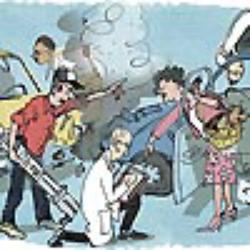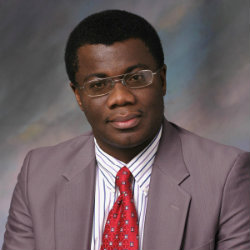Transportation and Infrastructure Systems Engineering
Transportation and Infrastructure Systems Engineering
As a branch of civil engineering, transportation engineering has a history that is long and illustrious and a future that is full of promise. The National Academy of Engineering has identified restoring urban infrastructure and implementing smart mobility as grand challenges. We need coordinated approaches to tackle transportation issues by integrating car, rail, bus, truck, walking and bicycling to meet sustainability goals. Currently, we see how smartphones have enabled ride sharing services such as Uber and Lyft, while taxis and GPS-equipped cars and trucks are providing massive amounts of data that was unimaginable a few years back. Before long, it may be common to have vehicles are talking to infrastructure (V2I) and vehicles talking to each other (V2V). Traffic flow with automated vehicles is expected to be much safer and more efficient than with human drivers.
The journey to that future will be fascinating and challenging. The safe and efficient movement of people and goods relies on infrastructure. Highways, airports, railroads, waterways and pipelines need to be planned, designed, operated, and maintained. Purdue's Transportation and Infrastructure Systems Engineering faculty offer a wide range of classes, research facilities, and experiences. Their efforts will have noticeable impacts on challenges such as:
- Asset management
- Data acquisition and analytics
- Emergency response
- Energy
- Freight Transportation and Logistics
- Environment
- Smart Mobility
- Sustainability
- Urban infrastructure
The award-winning Purdue Student Chapter of the Institute of Transportation Engineers introduces students to the transportation profession and fosters a close association of students with practicing engineers, educators from other institutions, and local and national chapters of ITE.
Spotlights
October 24, 2007
Prof. Fred Mannering has been featured in a New York Times article about the cause of traffic collisions.
June 28, 2007
The School of Civil Engineering would like to congratulate Professors Kumares C. Sinha & Samuel Labi on the recent publication of their book, "Transportation Decision Making: Principles of Project Evaluation and Programming."
April 25, 2007
Sarah M. Hubbard, graduate student, was recently selected by the Eno Transportation Foundation for the ‘Eno Fellows’ Class of 2007, a group of exceptionally promising graduate and doctoral students who plan to pursue careers in transportation. Eno Fellows are invited to participate in the Foundation’s Leadership Development Conference (LDC), an intensive week-long professional development program held each spring in Washington, D.C.
April 10, 2007
Kevin M. Ford, incoming graduate student, receives fellowship award from National Tau Beta Pi Fellowship program.
March 30, 2007
Professor Kumares C. Sinha, Olson Distinguished Professor of Civil Engineering, has been appointed to serve on a Blue Ribbon Panel of Experts for the National Surface Transportation Policy and Revenue Commission created by Congress.
March 9, 2007
A team of six traveled to India on a World Bank mission to review and make recommendations for the planning, design and construction aspects of national highway development program in India.
March 8, 2007
Andrzej M. Kwasniak, Anuj Sharma and Joshua Zvolanek are the 2007/2008 recipients of the ITE Indiana Section E.J. Cox Memorial Transportation Scholarship Award.
February 7, 2007
Researchers have determined that airbags and antilock braking systems do not reduce the likelihood of accidents or injuries because they may encourage more aggressive driving, thwarting the potential benefits of such safety features. Professor Fred L. Mannering states that these findings can contribute to improving advanced safety features.
February 5, 2007
The Transportation Research Board of the National Academies awarded Chuanxin Fang, Ph.D. 2003, and Assistant Professor Samuel Labi the Concrete Materials Section Bryant Mather Award for their research paper titled "Evaluating the Static Segregation Resistance of Hardened Self-Consolidating Concrete Using Image Processing Technology."
February 2, 2007
Ph.D. candidate Anuj Sharma and Professors Darcy Bullock and Srinivas Peeta received the 2007 Best Paper Award for their paper "Recasting Dilemma Zone Design as a Marginal Cost and Benefit Problem" conferred by the TRB Traffic Signal Systems Committee.
January 12, 2007
The Transportation Research Board (TRB) of the National Academies has appointed Professor Srinivas Peeta as the Chair of the Committee on Transportation Network Modeling, ADB30.
October 6, 2006
Researchers at Purdue University have created a mathematical simulation that could be used in a new national strategy to ease airport congestion and improve the overall transportation system.
September 26, 2006
The study results could be useful in shaping security procedures and providing ways to improve customer satisfaction as the airline industry struggles to maintain profitability amid economic factors such as high fuel costs and labor-management disputes, Fred L. Mannering, a professor of civil engineering at Purdue University, said. A paper detailing these important findings will appear September 25th in the Journal of Air Transportation Management.
August 8, 2006
Professor Srinivas Peeta, Transportation Engineering, will be the director of the center here at Purdue.
August 3, 2006
Zachary T. Clark, undergraduate student, Avery Rhodes, MSCE 2005, Professor Darcy M. Bullock of Transportation,
James Sturdevant, Traffic Management and System Operations Specialist with
USDOT, and Dave Candey, Technical Support Manager at Econolite Control Products, received the Transportation Research Board D. Grant Mickle Award
for best paper in the area of operations and maintenance, titled "Evaluation of Stop Bar Video Detection Accuracy
at Signalized Intersections".
August 3, 2006
Traffic safety can be greatly impacted by non-truck drivers' and freight truck drivers' behavior toward one another. Professor Srinivas Peeta, graduate student Pengcheng Zhang, and former graduate student Weimin Zhou is the research team of this study titled "Behavior-based analysis of freeway car-truck interactions and related mitigation strategies".
















